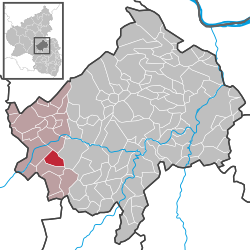Meckenbach
| Meckenbach | ||
|---|---|---|
|
||
| Coordinates: 49°46′42″N 7°30′46″E / 49.77833°N 7.51278°ECoordinates: 49°46′42″N 7°30′46″E / 49.77833°N 7.51278°E | ||
| Country | Germany | |
| State | Rhineland-Palatinate | |
| District | Bad Kreuznach | |
| Municipal assoc. | Kirn-Land | |
| Government | ||
| • Mayor | Klaus Willi Schlarb | |
| Area | ||
| • Total | 6.96 km2 (2.69 sq mi) | |
| Elevation | 280 m (920 ft) | |
| Population (2015-12-31) | ||
| • Total | 367 | |
| • Density | 53/km2 (140/sq mi) | |
| Time zone | CET/CEST (UTC+1/+2) | |
| Postal codes | 55606 | |
| Dialling codes | 06752 | |
| Vehicle registration | KH | |
| Website | www.meckenbach.de | |
Meckenbach is an Ortsgemeinde – a municipality belonging to a Verbandsgemeinde, a kind of collective municipality – in the Bad Kreuznach district in Rhineland-Palatinate, Germany. It belongs to the Verbandsgemeinde of Kirn-Land, whose seat is in the town of Kirn, although this lies outside the Verbandsgemeinde.
Meckenbach lies in the northern foothills of the North Palatine Uplands in a side dale of the Nahe.
Clockwise from the north, Meckenbach’s neighbours are the municipalities of Hochstetten-Dhaun, Merxheim and Heimweiler and the town of Kirn, all of which likewise lie within the Bad Kreuznach district.
Only seldom is Meckenbach mentioned in old documents. In the church register, a Meckenbach clergyman wrote that the derivation of the village’s name is even shrouded in darkness. It might be named after somebody named “Macko”, and would therefore mean “Macko’s Brook”, but this is not known for certain. The still current names for the village of “Hofhaus” and “Hofacker” (Hof can mean either “estate” or “farm” in German, while Haus means “house” and Acker means “field”, especially a cropfield) lead to the belief that the dale was settled with a few homesteads quite early on. In 1969-1970, an excavator being used in a gravel pit on the village’s outskirts in the high-lying area known as “Schmidts Eich” brought up some square stone urns, such as are also kept at the Bad Kreuznach local history museum. They come from one of the 36 barrows. The stone urns, which according to Karoline Cauer’s thinking were used in Roman burials, are held to be proof that the Meckenbacher Schmelze (“Meckenbach smelter”) already existed in Roman times. Moreover, copper slag have been unearthed and entrances to former copper mining galleries have been found. Long before the Romans and the Germanic peoples, in prehistoric times, the Bronze Age and the Iron Age (La Tène times), the Celts who dwelt on both sides of the Rhine already knew how to smelt copper and iron ores. That in itself is enough to believe that there was a settlement at what is now Meckenbach even then. In 451, the Huns, who had thrust out of Central Asia, were driven out at the bloody Battle of the Catalaunian Plains near Châlons-en-Champagne on the Marne. They left behind them burnt houses and depopulated countryside as traces of their flight. When the Alamanni arrived, they found destroyed villages and neglected fields. About 1000, Archbishop of Mainz and Imperial Archchancellor Willigis had a church built in Meckenbach, which was made subject to Disibodenberg Abbey. The original building is essential still preserved. It is a plain quarrystone building built in the Romanesque style with an east tower. The nave underwent an expansion about 1750. The church is also equipped with an organ from 1836, built by the Brothers Stumm from Rhaunensulzbach, which was renovated in 1981. The village always belonged in the Middle Ages to the Waldgravial Amt of Kyrburg, and in 1550 it became Calvinist. Even the peasants from Meckenbach had to pay the so-called Zollhafer (a toll in oats) to the Lords of Steinkallenfels whenever they wanted to sell their wares at Kirn Market. Until the late 18th century, Meckenbach was a Schultheißerei seat within the Oberamt of Kyrburg, where an official from the lordship provided the village administration as a Schultheiß in the name of the Waldgraves and Rhinegraves of Kyrburg. After French Revolutionary troops had overrun the German lands on the Rhine’s left bank and imposed their own administrative system on the conquered lands, Meckenbach was assigned about 1800 to the newly formed Mairie (“Mayoralty”) of Merxheim in the Canton of Meisenheim, also belonging to which were Bärweiler, Überhochstetten (Hochstetten) and Merxheim. This subsequently remained in force as the Oberschultheißerei of Merxheim within the Oberamt of Meisenheim once Napoleonic times were over and the village had passed under the terms of the Congress of Vienna to the Landgraviate of Hesse-Homburg. After the Oberamt of Meisenheim passed to the Kingdom of Prussia in September 1866, Meckenbach was assigned to the Bürgermeisterei (“Mayoralty”) of Meddersheim, wherein it remained until 1940, when it was assigned, along with Hochstetten, to the Amt of Kirn-Land.
...
Wikipedia



